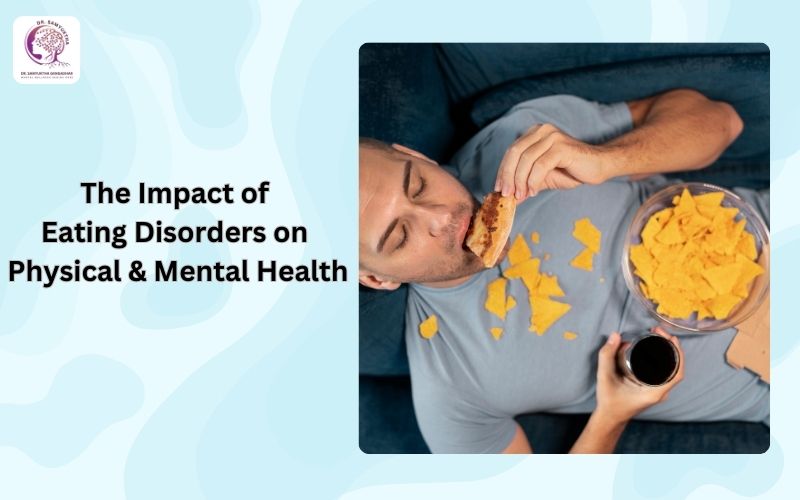Introduction
Eating disorders are serious mental health conditions that affect both physical and mental well-being. They encompass a range of disorders, including anorexia nervosa, bulimia nervosa, binge eating disorder, and other specified feeding or eating disorders (OSFED). At Pushpa Mind Care, under the expert guidance of Dr. Samyuktha Gangadhar, M.D. (Psychiatry), we delve into the profound impact these disorders have on individuals’ lives, highlighting the importance of understanding, treatment, and support. Our specialized eating disorders treatment in Kolkata and Bangalore aims to provide comprehensive care for those struggling with these challenging conditions.
Understanding Eating Disorders
Eating disorders are complex conditions characterized by unhealthy eating habits and a preoccupation with food, body weight, and shape. They often coexist with other mental health issues such as depression, anxiety, and obsessive-compulsive disorder (OCD).
Types of Eating Disorders

- Anorexia Nervosa: Driven by an intense fear of gaining weight, individuals severely restrict their food intake, leading to extreme weight loss. Individuals with anorexia often have a distorted body image, seeing themselves as overweight even when they are dangerously thin.
- Bulimia Nervosa: Involves episodes of excessive eating followed by attempts to purge through vomiting, the use of laxatives, or engaging in excessive exercise. Bulimia is characterized by a sense of loss of control over eating, followed by extreme measures to avoid weight gain.
- Binge Eating Disorder: Characterized by recurrent episodes of eating large quantities of food without subsequent purging behaviors.
- Other Specified Feeding or Eating Disorders (OSFED): Includes conditions that don’t fully meet the criteria of the above disorders but are still significant and require treatment. OSFED can encompass a variety of symptoms and behaviors that cause significant distress or impairment.
Physical Health Impact
Eating disorders can severely impact physical health, with some consequences being potentially life-threatening.
- Cardiovascular Issues: Malnutrition and electrolyte imbalances can lead to heart problems such as arrhythmias, bradycardia, and even heart failure. The heart, being a muscle, weakens without proper nutrition, and severe cases can result in sudden cardiac arrest.
- Gastrointestinal Problems: Chronic eating disorders can lead to significant gastrointestinal problems, such as constipation, bloating, and gastroparesis. For instance, laxative abuse can lead to long-term bowel issues and dependency.
- Bone Density Loss: Conditions like anorexia can lead to osteoporosis due to severe nutrient deficiencies, increasing the risk of fractures. Adolescents with eating disorders are particularly at risk as their bones are still developing.
- Reproductive Health: Eating disorders can disrupt menstrual cycles and fertility, causing long-term reproductive health issues. For example, women with anorexia may experience amenorrhea, the absence of menstruation.
- Dental Erosion: Particularly in bulimia nervosa, frequent vomiting can cause significant dental erosion and oral health problems. The stomach acid in vomit erodes tooth enamel, leading to cavities, sensitivity, and gum disease.
Mental Health Impact
The mental health effects of eating disorders are profound, often exacerbating existing psychological conditions and creating new ones.
- Depression and Anxiety: The preoccupation with food and body image can lead to severe depression and anxiety, contributing to a cycle of negative thoughts and behaviors. Individuals often feel trapped by their thoughts and behaviors, leading to a pervasive sense of hopelessness.
- Obsessive-Compulsive Behaviors: Many individuals with eating disorders exhibit obsessive-compulsive traits, further complicating their mental health. These can include rituals around food preparation and consumption.
- Social Isolation: The stigma and secrecy surrounding eating disorders often lead to social withdrawal and isolation, worsening mental health. Individuals may avoid social situations involving food or feel ashamed of their eating habits. Social isolation can intensify feelings of loneliness and depression.
- Cognitive Functioning: Malnutrition affects brain function, leading to difficulties in concentration, decision-making, and cognitive performance. Brain imaging studies have shown that severe malnutrition can alter brain structure and function.
- Low Self-Esteem: Persistent negative body image and self-perception contribute to low self-esteem and self-worth. This can be further exacerbated by societal pressures and unrealistic beauty standards perpetuated by the media.
The Role of Pushpa Mind Care
At Pushpa Mind Care, we emphasize a holistic approach to treating eating disorders, integrating physical and mental health care. Dr. Samyuktha Gangadhar, M.D. (Psychiatry), employs evidence-based treatments tailored to each individual’s needs.
Treatment Approaches
- Medical Stabilization: Addressing acute physical health issues through medical intervention. This includes hospital-based care for severe malnutrition and electrolyte imbalances.
- Nutritional Rehabilitation: Working with dietitians to develop balanced meal plans that restore healthy eating habits. Nutritional education is crucial for helping patients understand the importance of a balanced diet.
- Psychotherapy: Utilizing cognitive-behavioral therapy (CBT), dialectical behavior therapy (DBT), and other therapeutic approaches to address the psychological aspects of eating disorders. Therapy aims to transform harmful thought patterns and behaviors.
- Medication Management: Prescribing medications to treat co-occurring mental health conditions such as depression and anxiety. Medications like antidepressants can help manage symptoms and improve overall mental health.
- Support Groups: Facilitating group therapy sessions to provide peer support and reduce feelings of isolation. Connecting with others who share similar experiences can be profoundly therapeutic.
Prevention and Early Intervention
Prevention and early intervention are crucial in mitigating the impact of eating disorders. Public education, awareness campaigns, and early screening in schools and primary care settings can help identify at-risk individuals and provide timely intervention.
Tips for Prevention

- Promote Healthy Body Image: Encourage body positivity and self-acceptance.
- Educate About Nutrition: Provide accurate information about balanced diets and the dangers of dieting and weight control behaviors.
- Address Media Influence: Critically evaluate media messages about body image and promote diverse representations of beauty.
- Encourage Open Communication: Create environments where individuals feel safe discussing their struggles with food and body image.
Conclusion
Eating disorders profoundly impact both physical and mental health, necessitating a comprehensive and compassionate approach to treatment. At Pushpa Mind Care, Dr. Samyuktha Gangadhar and her team are dedicated to providing holistic care that addresses the multifaceted nature of these disorders. By understanding the serious implications of eating disorders and promoting prevention, early intervention, and supportive treatment, we can help individuals on their journey to recovery and improved well-being. For those seeking eating disorders treatment in Kolkata and Bangalore, Pushpa Mind Care offers expert guidance and support to ensure a brighter, healthier future.
FAQs
Family and friends can provide emotional support, encourage healthy habits, and participate in therapy sessions. Pushpa Mind Care involves families in the treatment process and offers guidance on effective support.
Treatment duration varies based on individual needs and severity. It can range from several months to years. Pushpa Mind Care provides ongoing support tailored to each patient’s recovery journey.
Acknowledging the problem and reaching out to a healthcare professional for a diagnosis and treatment plan is crucial. Pushpa Mind Care offers comprehensive assessments to tailor individualized treatment plans.
Yes, medication can be used to treat co-occurring conditions like depression and anxiety. At Pushpa Mind Care, we integrate medication management with therapy to support comprehensive recovery.

